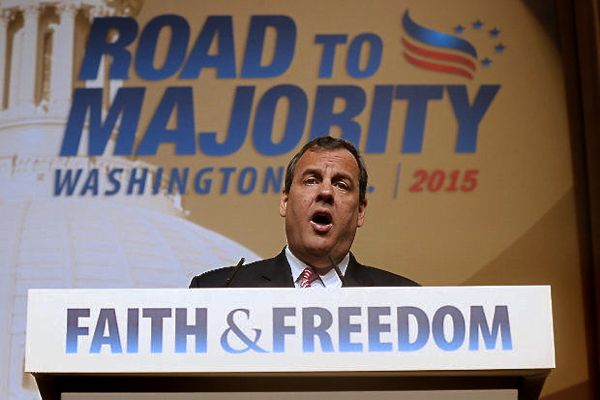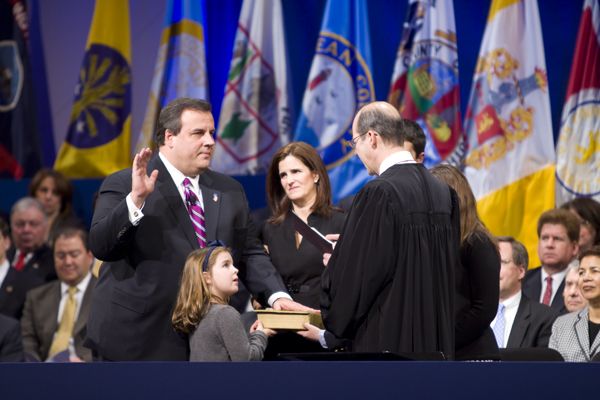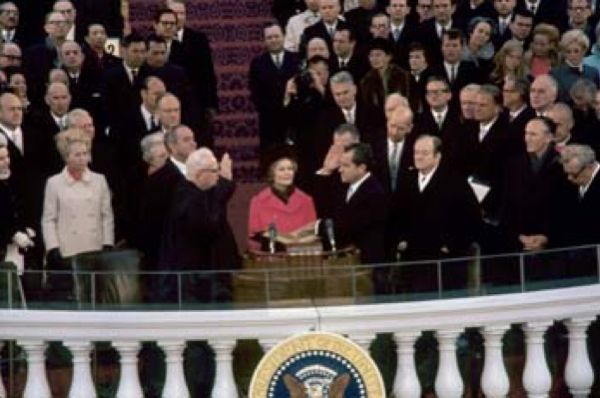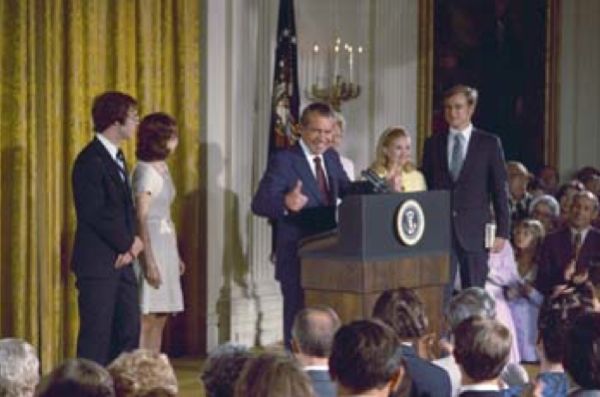Corporations Concocted The Christie “Faith and Freedom” Slogan Long Ago
Gov. Christie the latest in a long tradition of corporate sponsored charlatans, frauds, and demagogues
In an amazing example of serendipity, I had just begun reading Princeton University historian Kevin M. Kruse’s timely and marvelous new book: One Nation Under God – How Corporate America Invented Christian America when the Christie photo above caught my eye the other day.
Kruse is intrigued by the fact that the consensus among scholars is that the Founding Fathers established a wall of separation between church and state, yet that consensus has had little impact on popular opinion. Kruse asks why that is the case:
Like most scholars, I believe the historical record is fairly clear about the founding generation’s preference for what Thomas Jefferson memorably described as a wall of separation between church and state; a belief the founders spelled out repeatedly in public statements and private correspondence. This scholarly consensus, though, has done little to shift popular opinion. If anything, the country has more tightly embraced religion in the public sphere and in political culture in recent decades. And so this book begins with a different premise. It sets aside the question of whether the founders intended America to be a Christian nation and instead asks why so many contemporary Americans came to believe that this country has been and always should be a Christian nation. (page xiii)
Professor Kruse challenges the conventional historical interpretation that the rise of the Cold War is what explains the rise of public religion in the early 1950’s – those godless Soviet communists, their possession of the A-bomb, and all that.
Instead, Professor Kruse argues:
… the postwar revolution in America’s religious identity had its roots not in the foreign policy panic of the 1950’s, but rather in the domestic politics of the 1930’s and early 1940’s. Decades before Eisenhower’s inaugural prayers, corporate titans enlisted conservative clergymen in an effort to promote new political arguments embodied in the phrase “freedom under God”. As the private correspondence and public claims of the men leading this charge make clear, this new ideology was designed to defeat the state power its architect feared most – not the Soviet regime in Moscow, but Franklin D. Roosevelt’s New Deal administration in Washington DC. With ample funding from major corporations, prominent industrialists, and business lobbies such as the National Association of Manufacturers and the US Chamber of Commerce in the 1930’s and 1940’s, these new evangelists for free enterprise promoted a vision best characterized as “Christian Libertarianism”. (page xiv)
Corporate slogans – “Freedom Under God” (circa 1950) – “Faith and Freedom” (Gov. Christie today) – an unbroken chain of corporate economic propaganda.
Kruse then proceeds – in meticulous and at times shocking or amusing detail – to dismantle that conventional historical account and document how corporate interests manufactured and funded huge national religious propaganda campaigns as a cynical ploy to discredit and roll back the New Deal and capture government to promote corporate interests.
The corporate agenda was motivated by pure greed and economic self interests, not religion of patriotism.
The corporations knew that if they were publicly identified as the sponsors of these crude economic arguments, that they had little credibility with the American public, particularly given the popularity of the New Deal and welfare state.
So they cynically used religious leaders and religious institutions to mask their covert corporate economic agenda.
Business leaders had long been working to “merchandize” themselves through the appropriation of religion. In organizations such as Spiritual Mobilization, the prayer breakfast groups, and the Freedom Foundation , they had linked capitalism and Christianity and, at the same time, likened the welfare state to godless paganism. After decades of work, these businessmen believed that there efforts had finally paid off with the election of Dwight Eisenhower. Watching him enthusiastically embrace public faith, these supporters assumed that the national religious revival was largely a means to a more important end” the rollback of the New Deal state. ( page 86)
Kind of like today’s “dark money” and the Koch Brothers and ALEC and the religious right.
While the corporations were not successful (in the 1950’s) in their primary objective to roll back the New Deal welfare state (that had to wait for Democrat Bill Clinton’s welfare “reform”), one policy area where the corporations were successful was in rolling back government regulations:
Eisenhower did agree with his [corporate] supporters about the need to reduce the regulatory role of the federal government, especially in oversight of the business world. “I feel this country is following a dangerous trend when it permits too great a degree of centralization of government functions,” he wrote his brother in 1954. “When we came into office there were Federal controls exercised over prices, wages, rents, as well as over the allocation and use of raw materials. The first thing this Administration did was to set about the elimination of those controls. (page 86)
Fast forward 60 years and note that – just like Eisenhower – one of Gov. Christie’s first moves in Office was to issue a series of executive orders designed to rollback regulations and provide “regulatory relief” to corporations.
And Gov. Christie’s recent comments about his 5 year effort to “dismantle” environmental protections is a clear echo of Eisenhower.
Seen from this historical vantage point so wonderfully painted by Professor Kruse, Gov. Christie is just the latest in a very long line of corporate sponsored charlatans, snake oil salesmen, fakes, frauds and demagogues.
Kruse’s book is timely, I highly recommend it. The parallels to today are stunning.





